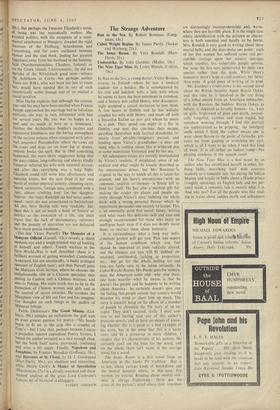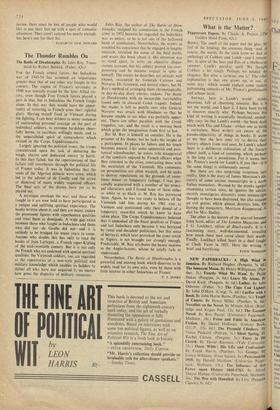EN Run to the Sea, a young doctor ; Victor Bronzo,
returns to Ireland--where he was a medical student---for a holiday. He is accompanied by his rich and indolent wife, a lady with whom he seems to have the bare minimum in common, and a history don called Henry, who disconcert- ingly accepted a casual invitation to join them. A few hours in Dublin and he has wilfully coupled his wife with Henry, and made off with a beautiful Italian an pair girl whom he meets in a. pub. They spend one night in a flat in Dublin, and next day continue their escape, guarding themselves with farcical dream-like in- tensity from possible/imaginary pursuit, and landing upon Victor's grandfather—a dear old thing who is rattling about like a• withered pea in some monstrous Victorian pod by the sea.
• All subsequent events are entirely Manipulated by Victor's` resolute, if misplaced, sense of ad- venture and What might be loosely described as his unconscious drives, bUt Mr: Bowmarylis original in the way in which all this is takeri for granted, and hiS hero's unconscious'—With no comment, enalysiS or excuses-- is firmly left" to fend for itself: He has also 'a marked gift fdr making' the reader' see places and People en- tirely through Victor's eyes, imbuing the whole book' with a' strong personal flavour which he ingenidusly persuades one entirely Waccept. This is an unusually good first novel; funny, Written with what reads like delirious skill and'ease and strongly recommended for those wlfo enjoy an intelligent book 'even if"it 'does hot deeply move them, or instruct them about humanity.
It is 'extraordinary What a long way indis- criminate` protest will get you. Pick one aspect of the ,human condition which you feel should be improved or even radially altered, and the chances' are you will bet' dubbed ob- sessional, sentimental,, lading, in,' proportion, etc.;. but go for the whole boiling lot and you are fairly sure to -be taken seriously. In Cabot Wright Begins, Mr. Purdy goes•for women, men, the American scene and—why stop there, one feels' wearily—what he means is that he doesn't like people and he happens to be writing about America: he certainly doesn't give one the feeling that people outside that country would broaden his mind or cheer him up, much. The story i's queasily hung on the efforts of a number of people to chronicle the life story of an ex- rapist. They dOn't succeed, really. I must con- fess to not having read any of this author's previous novels, and so have no means'of know- ing Whether this is a good or a bad example of his work, but in the sense that thiS is a nasty story told by a grown-up to nasty children, I suspect that it's characteriStic of his powers. He certainly can't see the trees for the wood, and on the whole there isn't room in the average
novel for a wood. •
The Inner Room is a first novel from an American in the Snake Pit tradition: that is to say, about various kinds of breakdown and the mental hospital where, in this case, five women 'are treated. Reading about mental sick- ness is always frightening: there are the areas of the patient's mind where their responses
are distressingly incomprehensible and, worse, where they arc horribly plain. It is the single case where identification with the patients or charac- ters is both essential and hardly to be borne. Mrs. Randall is very good at writing about these mortal hells, and she does make one point: each of her five women has suffered some real per- ceptible outrage upon her nature; outrages which sturdier, less vulnerable people survive, but none the less acts perpetrated by their own species rather than the gods. While there's humanity there's hope is cold comfort, but better than none. A good piece of writing of its kind.
Mr. Gardner's Understtike is his second novel about the British Security Agent Boysie Oakes, and this time he is involved in the test firing of a lethal missile from an American Submarine, with the Russians the baddics. Boysie Oakes, as before, is depicted as lovably human--i.e., keen on girls, frightened of pain and death, neuroti- cally forgetful, careless and even stupid, but somehow winning through. I find this portrait too Sophisticated to be gripping: the indulgeAt smile which I think the author means one to wear about Boysie to the, point 'of, faeeache, pre- vents me from gasping or stretching my eyes,• which is all I want to do when ,I read this kind of book. It is all rather an indoor romp—like playing cowboys in the squash court, The Nine Tiger Man is a first novel by. an author who has established herself in other,far- flung , fields, describing itself with accurate modesty as a romantic tale. Set during the Indian Mutiny and largely in India about a Hindu prince (roughly. speaking), an English lady and her per- sonal maid, a romantic tale is exactly what it Js. And why not? For all the people who like read- ing in trains about sudden death and subsequent
justice, there must be lots of people who would like to put their feet up with a spot of romantic adventure. They aren't catered for nearly enough, but here's one for their list.
ELIZABETH JANE HOWARD



































 Previous page
Previous page